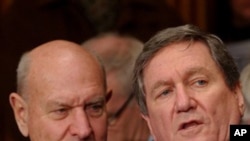Last week's death of Richard Holbrooke, the US Special Representative for Afghanistan and Pakistan left many questioning the immediate future of US policy in that region.
In the review of U.S. strategy in Afghanistan and Pakistan, President Barack Obama said the United States and its partners are "on track" to achieve their goals, although he pointed to just how fragile the gains have been.
One idea being circulated is that there had been discussions in the White house about the possibility of giving the United Nations a bigger role in the drive toward a resolution of the Afghan War. Reports indicated at the time that Holbrooke was against that idea.
VOA's Ira Mellman spoke with Ambassador Thomas Pickering, a former US Ambassador to the United Nations and now co-chair of a task force compiling a report on what best to do in Afghanistan. He asked Ambassador Pickering about the possibility of a larger role for the UN.
Pickering: "I suspect there is an ongoing difference as to whether the issue should be addressed at all, and if it should be addressed, whether an international body has more credibility with the parties or whether the US has to play the major, dominant, preeminent role in that process. I suspect that Holbrooke as special representative was leaning toward a situation in which the United States will play a major role. Having talked with him, I have no doubt at all that he understood clearly enough that the process of seeking some kind of negotiated settlement solution would have to involve large elements of objective, uncommitted, non subjective facilitation and mediation. While we never discussed the subject, it's certainly true that the United Nations has the capacity to provide that."
Q: Has the United Nations shown the willingness to provide that, and if so, in what form?
Pickering: "It's a very interesting question. The answer is that the United Nations is available to its member states. The United Nations does not normally pursue an aggressive policy in that direction unless it is invited in either informally or indirectly or sometimes formally. And I think at the moment serious uncertainty over whether a negotiating prospect is ripe or not right now has deferred that question until a later period."
Q: Do you any idea of a possible time frame when you say a later period?
Pickering: "It's very difficult to know because the simple equation there is - If the security equation is not moving advantageously, the supposition is that entering a negotiated process is not a good idea. My own feeling is a little different, and others internationally share this view. It is that if you're at the top of your form on the security issue, then it gives the advantage to the other side because they know the future is more downhill than uphill. On the other hand, if you are, in fact, moving uphill, there is an incentive on the other side's part to engage itself in negotiation. While this is not, in my view, widely understood and the former paradigm seems to be a preoccupation at the moment from those looking at the problem from the US point of view, I'm not certain that it isn't the right time now to begin to prepare the way for negotiation if you're prepared to eventually undertake that task."
Q: There are great doses of both optimism and pessimism when it comes to a resolution of the conflict in this part of South Asia. Where do you stand?
Pickering: "I am against extremes of either. My view is that there is plenty of pessimism to go around. There is an equally trying and difficult task to turn the challenges which we now deal with in a pessimistic way into opportunities. I believe we are now deeply involved in an effort to do so. My own feeling however, is that the diplomacy for the future has been subjected to a lower position in the order of priorities and it now needs to be looked at much more carefully and much more thoroughly; that we need to spend a serious amount of time looking at opportunities of a diplomatic effort along with our military counter insurgency effort to see whether, in fact, that synergy can be made to work for our advantage. I feel there are opportunities there."




